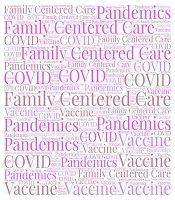Dear Editor,
As a pandemic, the 2019 coronavirus disease (COVID-19) has caused a severe shock to healthcare systems in most countries. Worldwide cases of COVID-19 have reached nearly 270 million, with over 5 million deaths. With the increase in the number of patients and the severe lack of medical resources and facilities in most countries, the working conditions for medical staff, especially nurses, have become very difficult. Increased workload, longer working hours, and lack of protective equipment, such as protective masks, etc. have created stressful working conditions for nurses (1, 2). Long working hours are challenging beyond mere professional commitment, leading to fatigue and burnout and negatively affecting their quality of life (health, physical, psychological, environmental, and social). In turn, these stressful conditions can lead to a reduction in many of the usual safety standards, reduced quality of care, unethical behavior, and a higher risk of medical errors (3).
During the last decade, with the transformation of modern health concepts and the development of medical models, the field of modern nursing has changed, and there has been an increasing emphasis on the issue of ways to increase parental involvement and well-being, which is aligned with the family-centered care (FCC) philosophy in neonatal intensive care units (NICUs) (4, 5). Family-centered care is based on mutual collaboration, participation, respect, and information sharing between families and healthcare professionals (6) that focuses on the care of a neonate around the family's morals, culture, and customs. In this approach, the nursing role changes from an active caregiver to a mentor and facilitator for parents (7). Studies reported that close collaboration with parents increases maternal presence in the NICU skin-to-skin care, and it has been associated with infant developmental outcomes and growth, greater feeding of mother's breastmilk, faster time to achieve full enteral feeding, weight gain, reduced major morbidities, medical procedures, sepsis, physiologic stress, pain-related stress, and duration of hospital stay (5, 8).
Compared to parents of healthy infants, parents in the NICU report higher levels of stress, depression, anxiety, and more adverse parenting outcomes, all of which have increased during the COVID-19 pandemic (5). While people can be inspired to help each other in difficult situations, a question remains unanswered: How do pandemic experiences change people's empathy for others (2)? Empathy is a key concept in nursing ethics with various functions, including promoting trust, better understanding and responding to patient's needs, and recognizing patients as unique individuals. It is defined as the ability to recognize, understand, and share the experiences, thoughts, and feelings of others in certain dire situations. Empathy is the human ability to be sensitive to the specific emotional stress and physical suffering experienced by others in painful pandemic situations (2, 9). The outbreak of a global health crisis can cause significant emotional changes in healthcare providers who typically have no special training in empathy or dealing with their own emotions. Empirical research shows that working effectively with others in suffering is essential to help build a strong therapeutic relationship and is associated with better clinical outcomes (10).
As our experiences in the NICU of an educational and referral hospital in Tehran, Iran, during the COVID pandemic, healthcare professionals and families of hospitalized neonates achieved mutual empathy and active participation as FCC for neonates' survival. This level III NICU has fifteen beds, and in a month, eight mothers of neonates died because of COVID. Everyone's emotions were aroused, and everyone was motivated to provide the best care and prepare these vulnerable neonates whose most under one kilogram for improving outcomes and earlier discharge. The presence and participation of parents in the care of neonates were attractive, and they were given strong training, including massage, respiratory physiotherapy for early mechanical ventilation weaning as well as skin-to-skin care, breastfeeding, sucking practice for gaining weight, and starting internal feeding as soon as possible. In the case of the deceased or the hospitalized mother, aunts or grandmothers were allowed to enter the NICU and participate in the neonate's care by observing safety tips. One day, we saw one nurse change her uniform and do skin-to-skin care for a neonate whose mother died. Everyone's tears flowed, but the efforts gave results. The frequency of skin-to-skin care and breastfeeding multiplied, and despite halving the length of stay in the NICU, the average weight of neonates at transfer or discharge time increased, neonatal infectious and mortality rates decreased as well as workload and stress of health care professionals decreased, and quality of care and satisfaction increased compared to before COVID. As a study concluded, the global fight against COVID-19 will ultimately help strengthen peace, cooperation, and friendship among nations (3). We trust that, together, we can overcome all pandemics with a vaccine called empathy.
